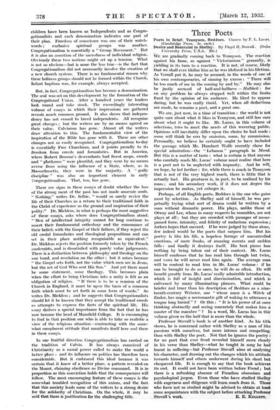Three Poets
Poets in Brief: Tennyson, Beddoes. Chosen by F. L. Lucas. (Cambridge Press. 5s. each.)
Desire and Restraint in Shelley. By Floyd IL Stovall.. (Duke University Press, U.S.A. '20s.)
WE are gradually coming back to Tennyson. The reaction against his fame, as against " Victorianism " generally, is yielding in its turn to a reaction. It is not,--of course, likely that we shall ever idolize him as he was idolized in his lifethim. As Verrall put it, he may be accused, in the words of one of his own contemporaries, of sinning by excess : " There will be too much of me in the coming by and by." He may also be justly accused of half-and-holiness — Halblteit : for on any problem he always stopped well within the limits fixed by the opinion' of his audience. He liked to appear daring,- but he was really timid. Yet, when all deductions
are made, he remains a poet, and a great one. , We are, just now, in a time of transition.: the world is not quite sure about what it likes in Tennyson, and still less sure about what it ought to like. Mr. Lucas, in this volume of selections, tries to meet the needs of this wavering public. Opinions will inevitably differ upon the choice he had made : some will think he errs by omission, some, by commission. Personally, we believe he certainly ought to have included the passage which Mr. Humbert Wolfe recently chose for special admiration—the " Lebanon " paragraph in Mated. But this is a matter of taste : what is certain is that anyone who carefully reads Mr. Lucas' volume must realize that here is a poet not to be neglected with impunity. And he will, we hope, be led further : for, while there is much in Tennyson that is not of the very highest reach, there is little that is actually bad. His greatness is, in part, to be realized by his mass ; and his secondary work, if it does not deepen the impression he makes, yet enlarges it.
Perhaps, of all English poets, -Beddoes is the one who gains most by selection. As Shelley said of himself, he was per- petually trying what sort of drama could be written by a man without dramatic power. His plays, unlike those of Otway and Lee, whom in many respects he resembles, are not plays at all ; but they are crowded with passages of unsur- passed force, intensity, and felicity of audacious expression ; forlorn hopes that succeed. If he were judged by these alone, few indeed would be the poets that surpass him. But his poetry is like his life, a hopeless farrago of uncontrolled emotions, of mere freaks, of amazing ascents and sudden falls : and finally it destroys itself. His best pieces lose nothing by being taken out of their context. Mr. Lucas himself confesses that he has read him through but twice, and vows he will never read him again. The average man will be content to read him in Mr. Lucas' volume : if he can be brought to do so once, he will do so often. He will benefit greatly from Mr. Lucas' really admirable introduction, which is full of insight and discrimination, and which is enlivened by many illuminating phrases. What could be briefer and truer than his description of Beddoes as a nine- teenth-century Webster, one " whose muse is a Witch of Endor, her magic a necromantic gift of waking to utterance a tongue long buried " ? Or this : " It is his power of at once thinking abstractly and seeing concretely that makes him a master of the macabre " ? In a word, Mr. Lucas has in this volume given us the half that is more than the whole.
Professor Stovall's- book is of another kind. As his title shows, he is concerned rather with Shelley as a than of like passions with ourselves, but more intense and compelling, than with Shelley the poet. Not that he ignores the poetry : for no poet that ever lived revealed himself more clearly in his verse than Shelley—what he taught in song he had learnt in suffering—but Professor Stovall ohm at analysing his character, and drawing out the changes which his attitude towards himself and others underwent during his short but chequered life. It is enough to say that the book achieves its end. It could not have been written before Freud ; but there is a refreshing absence of Freudian obsessions and psychological jargon. Even those who have studied Shelley with eagerness and diligence will learn much from it. Those who have not so studied might be advised to obtain at least some acquaintance with the subject before attacking Professot


















































 Previous page
Previous page